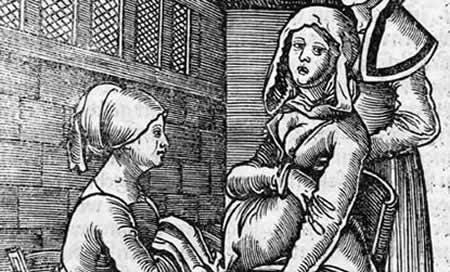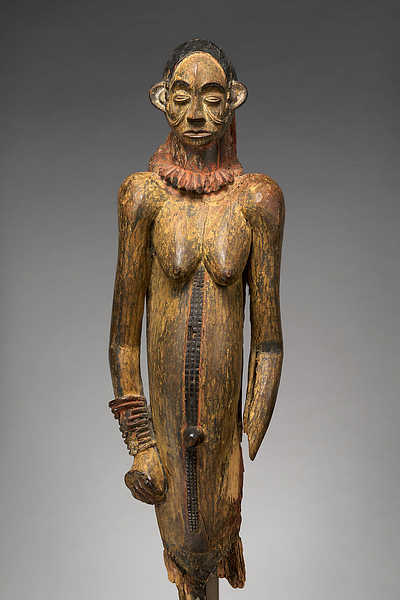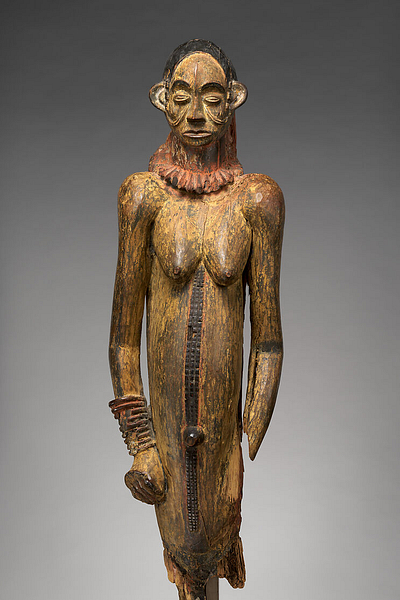Abortion and the Birth of the Double Standard / Resistance in the Salem Witch Craze
Continuing our Discussion of Bodily Autonomy, Gender, and Citizenship in Colonial American Legal History
How does this campaign ad appeal to certain citizens and make an argument for bodily autonomy?
This week we connect the case of Thomas/Thomasine Hall in Colonial Virginia, to the legal history of the double standard in abortion cases, and to the strategy used by an Arawak woman enslaved in Salem, Massachusetts to defend herself against a witchcraft accusation in the Salem trials.
We will use these cases to extend our discussion of bodily autonomy and masculinity and to consider the politics of identity in the history of citizenship.
When reading about legal cases, what does the law tell us about cultural values and social hierarchy?
Who is recognized as human? Who is objectified and dehumanized by the application of laws?
Who gets away with transgressions? Who is reassured and protected by the legal system?
For Tuesday:
For Thursday:
Further Reading:
I mentioned this episode in class—but for a lesbian centered worldview and laughs, check out the whole podcast:








How does this campaign ad appeal to certain citizens and make an argument for bodily autonomy?
This campaign ad appeals to citizens female and male by imposing Donald Trump as a secondary perpetrator of violence against women using implied imposition. After a long winded negative essay on her experience with early life rape, she states: "Donald Trump did this". While a strictly literal interpretation would associate this with Donald Trump's policy implications, there is an inference that transposes Donald Trump onto the malevolence of the actual perpetrator. This appeals to a political audience which is efficiently captivated by sentiments of blame, especially those affected by similar incidents. In this way it appeals to the public its argument for bodily autonomy by implying that those who stand in the way a woman's "right to choose" are as liable as rapists.
This week we connect the case of Thomas/Thomasine Hall in Colonial Virginia, to the legal history of the double standard in abortion cases, and to the strategy used by an Arawak woman enslaved in Salem, Massachusetts to defend herself against a witchcraft accusation in the Salem trials.
We will use these cases to extend our discussion of bodily autonomy and masculinity and to consider the politics of identity in the history of citizenship.
When reading about legal cases, what does the law tell us about cultural values and social hierarchy?
The law confers preferences to demographics that is at the top of the social hierarchy and what is culturally valued. Often these preferences are conferred in ambiguity or generalization. Particularly unvalued things or people are often isolated through specificity. For example, Thomas/ine was subjugated to multiple inspections of their genitalia in order to fulfill the court order/ law whereas Cisgender people were not. This confers a legal and cultural preference against Thomas/ine and towards Cisgender people. The responsibility for interrogation is also placed in the hands of the societally advantaged; all of Thomas/ines' inspectors were likely white.
Who is recognized as human? Who is objectified and dehumanized by the application of laws?
The people that were recognized as human were cisgender white males. The objectified persons are anyone that presented a challenge to the linear nature of that hierarchy. (Thomhas/ine, Arawak woman)
Who gets away with transgressions? Who is reassured and protected by the legal system?
Those instigating the proceedings are generally the people that get away with the transgressions and are reassured by the legal system which is most often white, cisgender males and females.
When reading about legal cases the law prioritizes white people over colored. Men are often protected by the legal system, as seen in Taking the Trade, the two men who killed a woman weren’t tried because at this point, she wasn’t seen as a “good” girl. The town tried to shame her because she was demonized for being pregnant out of marriage, but no one asked about who impregnated her. The men in this story were not brought to justice or penalized. Throughout history in many cultures woman are objectified and dehumanized, especially women of color. For example, Tituba was underestimated because she was a woman. Viewed as weak she used this to her advantage and talked her way out of being accused of witchcraft and executed. Tituba was very careful and calculative. When ready I was impressed that not only did, she manage to get out of her predicament, but she convinced the town that the ones responsible for witchcraft were white respected men. Often women were the ones accused of witchcraft, but she turned the tables. Tituba did what few (colored) women in history could and she got people to listen to her. It is sad to think the reason the townspeople were listening was because they were nosey, they wanted to watch her be punished. Unfortunately, they did not care about her well-being, but she overcame her situation and brought down the men who had done her wrong in life. Unlike with Sarah , these men were not protected by the legal system.